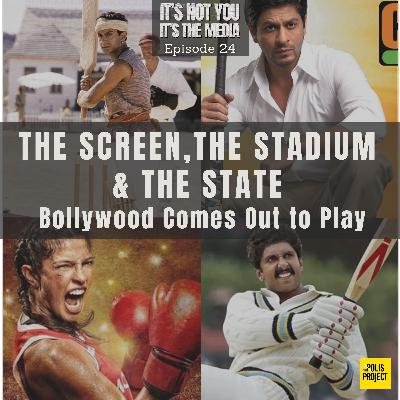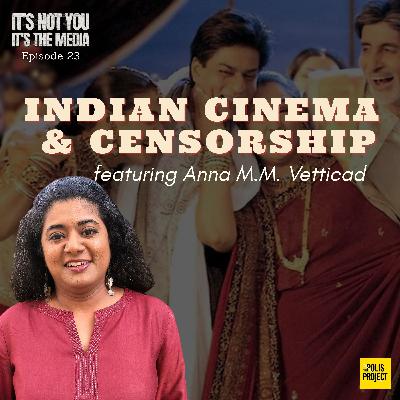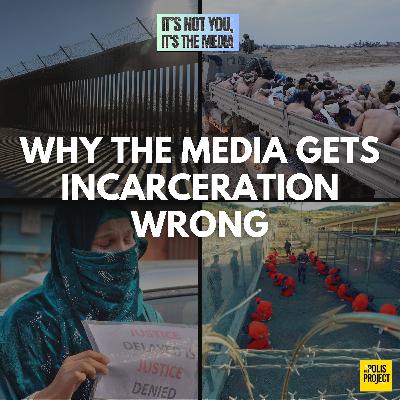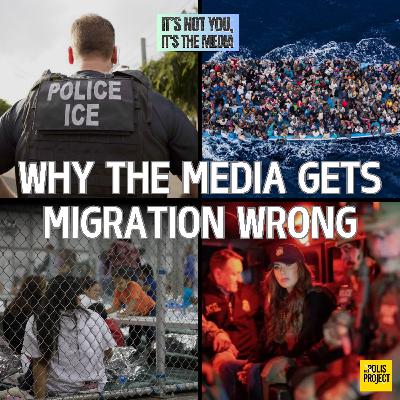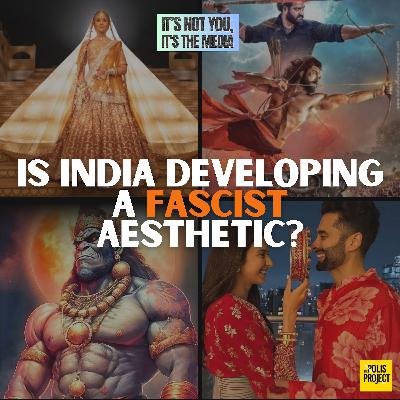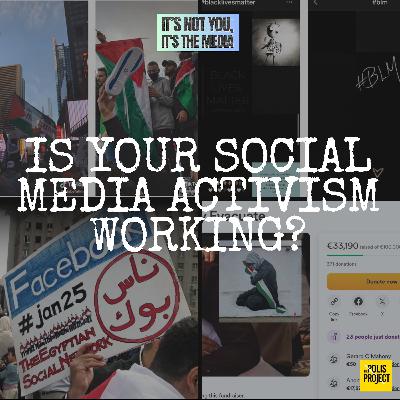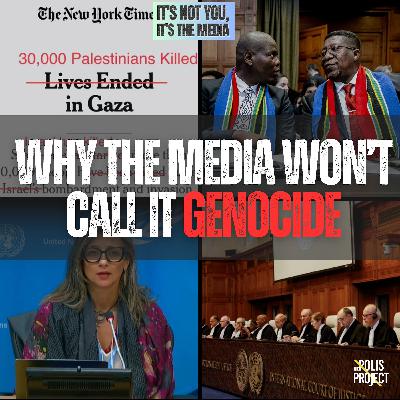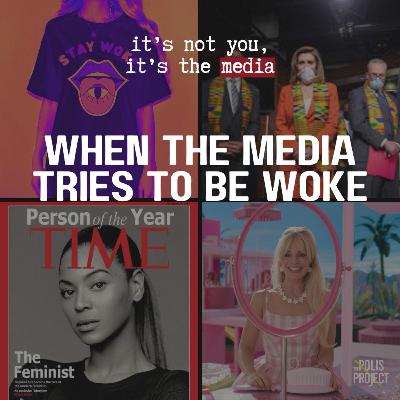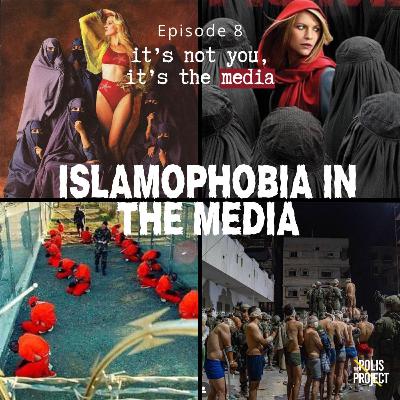Discover It's Not You, It's The Media
It's Not You, It's The Media

It's Not You, It's The Media
Author: The Polis Project
Subscribed: 5Played: 13Subscribe
Share
© Copyright 2025 The Polis Project
Description
It's Not You, It's The Media! unpacks the ways that the media manipulates narratives and makes you question your reality. You're being gaslighted. This podcast eviscerate the propaganda, set the record straight and offer moral clarity.
26 Episodes
Reverse
The hosts take a critical look at the algorithms ruling our lives on social media and beyond, with a warning to divest from celebrity content and culture that permeates the news cycle, politics, and more. Whereas the early Facebook and Instagram eras were known for curated and bespoke feeds that were personally made for you, social media has largely become a commercialized landscape with scarily targeted ads and influencers promoting the next big thing in makeup, skincare, clothing, and more.These algorithms have an outsized influence on politics too, and the hosts discuss the ways social and political movements drove engagement on social media – from the Arab Spring in the early 2010s to the movement for Palestine now. Even as communities on the margins seek to take advantage of the more “democratized” social media platforms, the companies that are so invested in keeping you scrolling relentlessly push celebrity and influencer content, no matter how much or little you engage with them. The hosts outline the algorithmic, commercial, and celebrity culture logics coming together at this moment, where you might want to share and find news about Palestine, but will be recommended reel after reel of Bollywood stars instead. We remain bystanders in an ongoing genocide, but are continuously fed celebrity content and forced to care about the intimate details of the lives of celebrities and influencers online. These algorithms are destructive, as they seek to distract and keep us complacent. The hosts call on our listeners to resist the algorithm and its seemingly all-encompassing control over our lives, so that we can reclaim power in the digital and physical information landscape.Key Takeaways:Social media algorithms have evolved from bespoke curated feeds to commercialized targeting, with specific ads geared towards us based on seconds-long interactions with postsThis algorithmic logic influences how news is circulated and consumed too – outlets like Buzzfeed that function primarily as news aggregators take advantage of celebrity culture to keep social media users engagedCelebrity culture has captured every sphere of our lives – going so far as to have celebrity endorsements and statements become key influences in election cyclesThe algorithm and social media companies benefit from the constant stream of intimate details of every celebrity scandal and personality that has destroyed our attention spans.Political content is constantly suppressed in favor of ever more ridiculous and polarizing posts and scandals, as is demonstrated by the shadow-banning of accounts posting about Palestine in the ongoing genocide.Keywords: celebrity culture, celebrity algorithms, algorithmic logics, influencers, social media, Facebook, Instagram, TikTok, Palestine, reels, For You page, curation, Gaza, genocide
The hosts take a sharp, playful, and unflinching look at Bollywood’s obsession with sports films and the not-so-subtle nationalism embedded within them. From Lagaan to Chak De! India to 83, they explore why India’s sports biopic industry has exploded in the past 15 years, and how these films turn real-life athletic struggles into patriotic spectacles. What makes a sports movie so irresistible? Why does every underdog story end in a tear-jerking celebration of the nation? And how does Bollywood sanitize the harsh realities of caste, gender, and systemic neglect in Indian sports, replacing them with glossy, emotionally manipulative narratives?The conversation moves from Lagaan’s colonial cricket fantasy to 83’s oddly racialized portrayal of the West Indies team. They examine how India’s sporting heroes — from Milkha Singh to Mary Kom — are repackaged for mass consumption, often stripping away the uncomfortable truths about their struggles. What does it mean when films like Dangal make a father the protagonist of his daughters’ success, or when Mary Kom erases the racism Northeastern athletes face? And why does every sports film, no matter how critical it starts out, inevitably circle back to a simplistic celebration of Indian exceptionalism?This episode also interrogates the way Bollywood builds masculinity through sports films, the influence of the influencer economy on how we view discipline and success, and how these movies manufacture nostalgia for a version of India that never really existed.Key takeawaysSports films thrive on feel-good nationalism. No matter how much struggle is depicted, the final message is always about national pride, often at the expense of addressing real inequalities.Underdog stories individualize struggle rather than critiquing systems. Instead of exposing the larger caste, class, and gender barriers in Indian sports, these films narrow the conflict down to a single corrupt official or a personal redemption arc.Women’s sports are shown through a male lens. Whether it’s Chak De! India centering Shah Rukh Khan over the women’s hockey team or Dangal framing the Phogat sisters’ success as their father’s victory, the female athlete is rarely the true protagonist.Bollywood repackages the “good Muslim” trope. Whether it’s Chak De! India or Dangal, Muslim characters are carefully written to be hyper-loyal and non-threatening, reinforcing an idea of “acceptable” patriotism.The nation gets credit for individual sacrifice. Films celebrate the perseverance of Indian athletes, but the moment they succeed, their personal triumph is absorbed into a larger nationalist narrative.Bollywood’s nostalgia machine is relentless. If modern India can’t be romanticized, these films turn to past sporting glories — like 83 and Gold — to construct a sentimental vision of unity and victory.KeywordsBollywood, sports movies, nationalism in film, underdog narratives, caste in sports, cricket, Lagaan, 83, Chak De! India, Dangal, Mary Kom, masculinity in cinema, patriotic storytelling, Indian identity, Akshay Kumar, nostalgia politics, media and state propaganda.A podcast by The Polis Projectwww.thepolisproject.com
The hosts are joined by award-winning film critic and journalist Anna M.M. Vetticad for a conversation on the state of Indian cinema under Modi-era censorship. A veteran of over 30 years in journalism, Anna brings her incisive political analysis and deep knowledge of film culture to this episode — exposing how India’s cinematic landscape has become a battleground for ideology, identity, and power.The episode opens by locating cinema as a contested space — one long understood by right-wing regimes as a site of influence. Cinema’s ability to shape narratives and rewrite memory has been crucial to the rise of fascist aesthetics in India. Anna unpacks this, walking us through the seismic shifts she’s witnessed as the Hindi film industry folds itself into a willing arm of propaganda — while regional cinemas like Tamil and Malayalam push back, albeit within their own deeply patriarchal structures.Together, the hosts and Anna break down the difference between old and new censorship — no longer confined to the formal mechanisms of the CBFC, but a sprawling ecosystem of soft coercion, self-censorship, ideological appeasement, and weaponised “hurt sentiments.” Anna explains how even innocuous details — like a character eating chicken or bearing a Hindu name — are now seen as political provocations. The conversation draws from Anna’s landmark Article 14 investigation, revealing the growing climate of fear, complicity, and ideological capture among India’s most powerful cultural producers.But the rot isn’t just institutional — it’s also representational. The group traces the casteist and communal undercurrents of blockbuster films like RRR and Kesari, the masculine saviour complex glorified in pan-India hits, and the soft erasure of minority identities in so-called secular classics like Veer-Zaara. Anna also sharply critiques the toxic misogyny embedded within South Indian industries, questioning how progressive a cinema can be when it remains tethered to structures of hero worship and patriarchal dominance.Even amid this, there are flickers of resistance. Anna urges us to remember the stakes — and the power — of storytelling. Anna leaves us with a cautious optimism: that pushing too hard might spark a reckoning, that even in the face of repression, stories will find their way through.KeywordsIndia, cinema, censorship, Modi, soft power, propaganda, Hindutva, self-censorship, Veer-Zaara, Kesari, RRR, Article 14, misogyny, South India, secularism, interfaith romance, fascist aesthetics, narrative, resistance.Read some of Anna’s work here:How A Modi-Era Ecosystem Of Official & Unofficial Censorship Is Transforming India’s Film Industries, Article 14, https://article-14.com/post/how-a-modi-era-ecosystem-of-official-unofficial-censorship-is-transforming-india-s-film-industries-679fdbcd6f914Hindi cinema’s lone rangers: Dissent in a sea of propaganda films, The News Minute, https://www.thenewsminute.com/news/hindi-cinemas-lone-rangers-dissent-in-a-sea-of-propaganda-filmsTrial by Cinema, Supreme Court Observer, https://www.scobserver.in/75-years-of-sc/trial-by-cinema-films/A Wake-up Call for All Indian Film Industries, The Quint, a...
As the crackdown on immigration and violent deportations explode across the US, Suchitra, Bhakti, and Madhuri are joined by journalist Tanvi Misra to peel back the bureaucratic spectacle of American border regimes. The conversation takes a deeper look at how legal status — once seen as a form of protection — is increasingly weaponised by the state to police dissent, particularly among immigrants and students engaged in pro-Palestinian activism. Green card holders and international students, once thought to be “safe” under the law, are now facing ideological screening, detention, and deportation — revealing how even legal status offers no true safeguard in a system built to punish and control.Tanvi draws from years of investigative reporting to expose how visa systems, detention infrastructures, and digital surveillance are being leveraged not only to exclude and deport, but to criminalise entire identities. The episode interrogates the binary between legal and illegal status that is not only porous but deliberately engineered to collapse when politically expedient. Whether it’s AI-generated accusations, ICE raids in academic spaces, or the targeted revocation of green cards, what emerges is a state apparatus built on opacity, fear, and unchecked discretion.Private prison corporations and county jails profit from detention quotas, with a direct correlation between the presence of detention facilities and anti-immigrant legislation. The hosts explore the staggering level of discretion granted to individual ICE agents and border officers — discretion that enables arbitrary and biased enforcement, from SEVIS account purges to on-the-spot visa revocations. The hosts and Tanvi explore how this ecosystem is maintained — through corporate profiteering, media complicity, and a public desensitised by a carousel of dehumanising images. At the heart of it is a chilling question: when even legal status is no protection, what remains of the social contract?Tanvi Misra a writer and journalist covering immigration, criminal justice, and urban policy. Her work has appeared in The Nation, The Atlantic, The New Republic, and more. She was a 2022 Ira A. Lipman Fellow at Columbia University. She received the Pulitzer Center’s Global Reporting Grant in 2023. https://www.tanvimisra.com/Links to Tanvi Misra’s articlesNo Children Here, The Baffler, https://thebaffler.com/salvos/no-children-here-misraThe Pipeline Funneling US Deportees to Haitian Prison, The Nation, https://www.thenation.com/article/society/deportation-haiti-prison-conditions/The children of tech’s guest workers are pushing for immigration relief, The Verge, https://www.theverge.com/22585007/h1b-dependent-visa-age-out-documented-dreamers-immigration-reform‘I Became a Jailer’: The Origins of American Immigrant Detention, Bloomberg, https://www.bloomberg.com/news/features/2021-07-20/the-origins-of-american-immigration-detentionBroader Crises, The Baffler, https://thebaffler.com/latest/broader-crises-misraThe Ugly Bipartisan Obsession with the “Right” Number of Immigrants,...
The hosts turn their lens on the insidious, galvanizing power of the opinion column. The hosts dissect how elite liberal media platforms like The New York Times, The Washington Post, The Atlantic, and The Wall Street Journal have weaponized their op-ed pages to manufacture consent, launder imperialist narratives, and maintain the myth of expert credibility.The episode charts how op-ed writers and columnists such as Thomas Friedman, Nicholas Kristof, Maureen Dowd, and Paul Krugman have not only shaped public perspectives on issues but have actively steered foreign policy — often disastrously — through deeply polemical and emotionally manipulative writing. The hosts spotlight how newspapers use these columns as smokescreens, publishing “respectable” pieces by establishment figures while relegating critical or anti-imperialist perspectives to the realm of “guest opinions,” stripped of journalistic weight.They also dive into the complicity of non-white writers like Sadanand Dhume and Tunku Varadarajan, whose op-eds in economic and financial outlets weaponize histories of trauma to justify genocidal rhetoric, as in Dhume’s piece asking why Palestinians can’t just be “relocated” like Indians and Pakistanis were during the Partition. The hosts ask: why are these men handed megaphones and deemed a “credible” voice?From Hillary Clinton’s recent smug opinion on the Signal leaks to the op-ed that told poor Americans to skip breakfast, the episode lays bare the contempt these media giants have for the public they pretend to inform. The trio also revisit the coverage of Afghanistan, the Iraq War build-up, Gaza today, and the selective use of the word “genocide”. The episode ends on a sobering note: the war is not just “over there.” State repression, censorship, and violence against protesters in the US are proof — the war has come home.Key TakeawaysOp-eds can sway readers on big issues, manufacture consent, frame acceptable narratives, and create the illusion of balance while entrenching imperialist, elitist agendas.Liberal media launders its image by selectively platforming marginalised voices in the opinion section — never the news desk — framing truth as just “another perspective.”Figures like Thomas Friedman and Nicholas Kristof have consistently failed upward, steering disastrous foreign policy while being proven wrong repeatedly — and are still being treated as experts.Opinion columns from non-white writers can be used to give genocidal narratives a multicultural gloss, legitimizing apartheid and war crimes.KeywordsOpinion, journalism, New York Times, liberal hypocrisy, Thomas Friedman, Nicholas Kristof, Maureen Dowd, Sadanand Dhume, Tunku Varadarajan, op-eds and war, Palestine, Gaza genocide, American imperialism, gaslighting, Hillary Clinton, Wall Street Journal, expertise, censorship, NYT guest opinion, disinformation in media.A podcast by The Polis Project www.thepolisproject.com
The hosts invite writer, editor, and translator Yousef Aljamal for a moving and intimate conversation that honours the life, work, and enduring legacy of the late Refaat Alareer — Palestinian writer, poet, professor, and beloved mentor assassinated by Israel in December 2023. Yousef was Refaat’s student, collaborator, and close friend. Yousef assembled and edited the book If I Must Die: Poetry and Prose by Refaat Alareer which was published early this year. He speaks with clarity, wit, and tenderness about the man whose imagination helped birth an army of writers out of besieged Gaza, including the powerful collection Gaza Writes Back Together, the hosts and Yousef reflect on Refaat’s literary and political ethos — his belief that storytelling is resistance, that fiction outlives fact, and that freedom begins in the imagination. They unpack how Refaat fused humour with rage, literature with politics, the classroom with the battlefield. The conversation also considers the role of US universities, the complicity of elite institutions, and the radical hope fuelling a generation of students who refuse silence in the face of genocide.The title of the episode cites Susan Abulhawa's introduction to the book If I Must Die where she writes that Refaat's death reminded her of Berta Cáceres of Honduras, "another indigenous leader who, like Refaat, was murdered because the light of her being shone too brightly...When she died, the rallying cry of the thousands who loved and followed her was, “Berta no murió, se multiplicó!” Links to buy the booksIf I Must Die: Poetry and Prose by Refaat Alareer edited by Yousef Aljamal https://orbooks.com/catalog/if-i-must-die/ Gaza Writes Back: Short Stories from Young Writers in Gaza, Palestine edited by Refaat Alareerhttps://justworldbooks.com/books-by-title/gaza-writes-back/ KeywordsRefaat Alareer, If I Must Die, poetry literature, poetry storytelling, resistance, genocide, student activism, Gaza, settler colonialism, humour, legacy, education, poetry, writing as survival, social media, imagination, liberation, radical pedagogy, narrative power, campus repression, academic freedom.A podcast by The Polis Projectwww.thepolisproject.com
The podcasts takes on the alarming escalation of state repression against pro-Palestinian student protesters in the U.S. The episode unpacks how legal frameworks, university complicity, and media narratives have converged to criminalize dissent on campus. From ICE raids to administrative gag orders, they break down how universities have transformed into enforcement arms of the state, silencing student activists under the guise of “safety” and “neutrality.”They examine the weaponization of outdated laws like the McCarran Act, the use of AI-generated accusations to justify dismissals, and the absurd contradictions of free speech protections in the U.S.—where hate speech against Palestinians is permissible, but calls for divestment are met with police crackdowns. The episode also takes aim at the media’s role in this repression. While liberal outlets have covered the protests, their language is riddled with caveats, implying that student activists are extremists or Hamas sympathizers. What does it mean when institutions built to foster debate become sites of surveillance, punishment, and exile? How do we make sense of universities that prioritize financial ties to weapons manufacturers over the safety of their own students? And why does the state fear student movements so much? The hosts argue that history has already answered that question: because student protests always win.Key TakeawaysUniversities have become state enforcement tools. Instead of protecting students, elite institutions are inviting police and ICE onto campuses, facilitating arrests, and even revoking degrees.Laws from the McCarthy era are being revived to justify deportations. The McCarran Act—once used to target communists—is now being wielded against pro-Palestinian students, criminalizing their activism.The media subtly discredits student protests. Liberal outlets report on campus crackdowns but hedge their support with language that casts doubt on protesters’ legitimacy, subtly aligning with state repression.Free speech protections are selectively applied. Hate speech against Palestinians is tolerated as “political discourse,” but calls for divestment from arms manufacturers are met with police violence.KeywordsStudent protests, campus repression, Palestine solidarity, McCarran Act, ICE raids, Columbia University, academic freedom, free speech hypocrisy, divestment, surveillance state, media complicity, legacy media, Zionist lobbying, university funding, policing dissent, historical student movements.A podcast by The Polis Project www.thepolisproject.com
The hosts take a sharp, witty, and incisive look at the identity crisis of Indian American women in the public eye. From Kamala Harris to Mindy Kaling to Usha Vance, the hosts ask: why is the dominant representation of the Indian American woman so adjacent to whiteness? Why does she either perform hyper-assimilation or lean into fetishised exoticism? In an era where South Asian identity is being flattened into elite, upper-caste, and Hindu-coded narratives, how do we reclaim a more expansive, authentic brown identity?The hosts dissect Mindy Kaling’s on-screen self-erasure, Usha Vance’s conservative alliances, and the broader South Asian diaspora’s complicity in white supremacy. They examine how caste privilege shapes diasporic politics, how food and media representation have been co-opted, and why so many Indian Americans seek proximity to power instead of solidarity with marginalised communities.This episode also asks: is there a way forward? They explore figures like Padma Lakshmi, who has maintained an unabashedly brown identity despite liberal constraints, and critique the rise of regressive South Asian comedy that recycles tired stereotypes for Western approval. From Indian Matchmaking’s caste erasure to Zarna Garg’s traditional parenting jokes, the hosts unpack why certain narratives thrive while others are erased.Key TakeawaysWhether through Usha Vance’s conservative alignment or Mindy Kaling’s relentless need to “prove” her Americanness, Indian American women in the public eye often seek whiteness as a marker of success.The upper-caste dominance of South Asian migration shapes political and social attitudes, reinforcing Hindu supremacy and white supremacist alliances.Figures like Kamala Harris and Priyanka Chopra signal progress but rarely challenge systemic structures. Is a “brown face in a high place” enough?Zarna Garg, Lily Singh, and other South Asian comedians rely on outdated tropes of strict immigrant parents and curry-scented jokes, reinforcing stereotypes instead of dismantling them.Instead of flattening identity for laughs or assimilation, Indian American women need to embrace a more complex, radical, and self-determined identity.References"The Coconut Empire: How Mindy Kaling Has Created a Prototype of the Indian-American Woman Who Aspires to Whiteness" by Bhakti Shringarpure https://www.thepolisproject.com/read/mindy-kaling-coconut-indian-american/KeywordsIndian American, caste privilege, whiteness, South Asian diaspora, Mindy Kaling, Kamala Harris, Usha Vance, Priyanka Chopra, Padma Lakshmi, model minority myth, Bollywood, Indian Matchmaking, Zarna Garg, comedy stereotypes, brown identity, liberal politics, white supremacy, Hindu nationalism, feminism, intersectionality.A podcast by The Polis Project www.thepolisproject.com
The hosts take on the media’s failure to accurately depict incarceration, tracing how language, imagery, and selective storytelling reinforce carceral logic. From Gaza to Guantanamo, they examine how imprisonment narratives are shaped by what is shown — and, more crucially, what is omitted. The hosts dissect how terms like prisoner, detainee, and hostage are selectively deployed to justify systemic violence, and how the very framing of incarceration distorts public perception.The discussion moves beyond conventional notions of imprisonment, arguing that entire societies — Palestinians in Gaza, Kashmiris under curfew, and detainees in refugee camps — are subjected to incarceration beyond prison walls. They also expose how mass incarceration in the U.S. extends beyond bars, as formerly incarcerated individuals face lifelong stigma, exclusion, and economic precarity. From the use of prison labor in wildfire response to the privatization of detention centers, the episode unpacks the profit motives fueling the carceral state.Key TakeawaysThe media manipulates language to justify detention, torture, and oppression. Palestinians are “prisoners,” implying guilt, while Israelis are “hostages,” evoking sympathy. The same linguistic distortion extends to Guantanamo and U.S. prisons.In the U.S., former prisoners face a de facto life sentence: denied jobs, benefits, and opportunities for reintegration. Incarceration follows them forever, reinforcing systemic exclusion.From occupied Gaza to curfews in Kashmir, entire populations live under carceral control. The refugee camp, detention center, and military checkpoint function as open-air prisons.Digital surveillance, AI policing, and biometric tracking have made imprisonment more insidious. Even everyday tech—Apple tags, facial recognition—normalizes constant monitoring.Private prisons, immigrant detention centers, and forced prison labor generate billions. Wildfire responders, agricultural workers, and factory laborers in the U.S. prison system work for pennies while corporations profit.Modern aid relies on detention: refugees are confined to camps, subjected to surveillance, and denied agency. Entire generations are born into stateless limbo, dependent on state-sanctioned control.Tech billionaires like Sam Altman advocate for a future where people give up rights for AI-driven governance, accelerating the normalization of digital captivity.KeywordsIncarceration, prison-industrial complex, Gaza, Guantanamo, Kashmir, surveillance capitalism, refugee camps, private prisons, carceral state, forced prison labor, Guantanamo Bay, digital surveillance, AI policing, language bias, Palestine, open-air prison, dehumanization, media complicity, policing, apartheid, humanitarian detention.A Podcast by The Polis Project https://www.thepolisproject.com/
Suchitra, Bhakti, and Madhuri dissect the persistent failures of media coverage on migration, exposing how mainstream outlets reinforce state narratives rather than challenging them. From the selective sympathy extended to Ukrainian refugees to the criminalization of Black and Brown migrants, the hosts examine how race, class, and geopolitical interests shape reporting. They trace the media’s historical complicity in dehumanizing migrants and explore the political incentives behind the language of “legal” and “illegal” migration.This episode unpacks the realities of forced deportations, ICE raids, and the bipartisan commitment to border enforcement, revealing how liberal and conservative media alike obscure the violence of immigration policies. What does it mean when the media celebrates the same border policies under Biden that are then condemned under Trump? Why do countries that welcome Ukrainian refugees reject brown and Black asylum seekers? And how does the language of “national security” mask racialized violence at the border? This episode examines how the media serves as a megaphone for state power rather than a force for accountability.Key TakeawaysMigration reporting is deeply racialized. Ukrainian refugees were framed as “deserving” and “civilized,” while Black and Brown migrants are criminalized or reduced to statistics.The bipartisan myth of humane immigration policies. While Trump’s ICE raids were met with media outrage, Biden’s administration has quietly overseen mass deportations—without the same level of scrutiny.Journalists insist on an allegiance to paperwork, documentation and to legal frameworks when it comes to migration but reject those same ideas when it comes to something like Palestine. The fetishization of migrant culture coexists with anti-migrant policies. The West embraces “authentic” migrant food and literature but enacts violent border enforcement against the people who create them.Migration is an economic and colonial issue, not just a legal one. The US and Europe continue to destabilize nations through war, climate destruction, and economic policies, then criminalize those displaced by these conditions.Journalists are complicit. The media amplifies state narratives on “illegal immigration” while failing to investigate the broader systemic causes of displacement.KeywordsMigration, deportation, ICE raids, sanctuary cities, media complicity, refugee crisis, asylum seekers, Biden immigration policy, Trump, Guantanamo, Haitian migrants, Venezuelan refugees, Palestinian displacement, media literacy, national security narratives, climate migration, colonial borders.A podcast by The Polis Project www.thepolisproject.com
Suchitra, Bhakti, and Madhuri look at how India’s cultural landscape has become deeply intertwined with right-wing ideology. From Bollywood’s hyper-masculine action heroes to the aggressive iconography of Hindu gods, from the spectacle of nationalist weddings to the militarization of everyday imagery, the episode unpacks how aesthetics shape political obedience. The hosts trace how authoritarian regimes have historically used visual culture — sculpted bodies, rigid pageantry, and hyper-masculinity — to manufacture patriotic obedience. In India, these elements have been absorbed into entertainment, fashion, and religion, reinforcing a Hindutva-dominated visual order.Bollywood has played a major role in this shift, moving from chaotic ensemble films to hyper-stylized nationalism. Hindu gods, once diverse, have been transformed into warrior-like, Aryanized figures, while traditions like “karva chauth” and luxury weddings have been aestheticized as nationalist performances. Even Narendra Modi has mastered the fascist aesthetic, from his 56-inch chest mythology to his media-choreographed religious spectacles. The episode also asks: where is counterculture? As Bollywood, media, and fashion fall in line with this authoritarian visual order, the space for resistance shrinks. The takeaway? When culture normalizes uniformity, politics follows.Key Takeaways:A fascist aesthetic thrives on uniformity, hyper-masculinity, and the glorification of violence. These visual markers have become deeply embedded in Indian pop culture.Bollywood’s transformation from chaotic, diverse narratives to hyper-nationalist action spectacles reflects a broader ideological shift.Hindu iconography has been rewritten to align with muscular nationalism, transforming once-diverse religious imagery into rigid, militarized depictions.Cultural rituals like “karva chauth” and wedding spectacles have been aestheticized and flattened into a single, dominant narrative of Indianness that aligns with Hindutva ideology.Modi has mastered the performance of muscular nationalism, crafting an image of strength and control that is as much about aesthetics as it is about politics.Keywords:Fascism, aesthetics, muscularity, nationalism, Bollywood, Hindutva, propaganda, Karva Chauth, Modi cult, wedding industrial complex, Instagram, nationalism, consumerism, uniformity, authoritarianism, obedience, spectacle, erasure.A podcast by The Polis Projectwww.thepolisproject.com
Suchitra, Bhakti, and Madhuri take a step back from the incessant noise of social media to dissect what all that posting really leads to. Is your social media activism actually making a difference? From the early days of Twitter-fueled revolutions to the performative hashtag activism that followed, the hosts trace the history of online organizing and examine its transformation in the wake of Palestine’s genocide. At a time when mainstream media has fully aligned with state narratives, Instagram and TikTok have become essential sources for alternative reporting — while simultaneously being controlled by billionaires with vested interests in suppressing dissent.The episode dives into how social media has blurred the lines between activism, consumerism, and self-promotion. They interrogate the role of fundraising, questioning whether crowdfunding is empowering or an indictment of a state that has abdicated its responsibilities. They also explore the exhausting and often exploitative nature of trauma-sharing, the rise of hyper-individualized resistance, and the troubling shift of activism from structural intervention to spectacle. This episode unpacks the effectiveness — and limitations — of social media as a tool for real change.Key TakeawaysSharing a post or donating to a fundraiser offers instant catharsis, but does it translate into material change? The hosts discuss how digital activism often functions as a quick, conscience-clearing act rather than sustained resistance.Graphic imagery of violence and oppression is widely circulated in the name of awareness, but does it radicalize or merely desensitize? The hosts challenge the ethics of “pornographic” suffering and its role in online activism.Crowdfunding for humanitarian aid has become necessary in a collapsing world, but it also reinforces individual responsibility over systemic accountability. There’s a shift from collective demands to reliance on the generosity of the wealthy.Social media has reshaped activism into a performance, where “activists” are incentivized to prioritize visibility over strategy. Algorithms and virality distort collective movements into individual branding.In-person organizing is crucial as seen in the ongoing pro-Palestinian protests: real-world action, not just social media outrage, is necessary for momentum.KeywordsSocial media activism, digital resistance, Palestine, fundraising, neoliberalism, crowdfunding, cultural work, performative activism, spectacle, misinformation, political organizing, billionaires, Meta, TikTok, Elon Musk, Mark Zuckerberg, trauma-sharing, de-platforming, censorship, algorithmic suppression, organizing beyond social media.Podcast by the Polis Project https://www.thepolisproject.com
Suchitra, Bhakti, and Madhuri look into the crystal ball to offer up some forecasts about how the media will respond to a second Trump presidency. Reflecting on his first term, the hosts remember liberal media’s relentless obsession with his persona, his life, his tweets and his gaffes, all of which overshadowed policy critique and normalized him and his politics through repetition and over-exposure. They predict that the same media preoccupation with his personality, his wife and his kids will return but this time with an added element of Trump’s current “bromance” with tech billionaires like Elon Musk and Jeff Bezos who are set to take center stage in the White House. The hosts warn listeners about the return of performative resistance led by white feminists eager to reclaim their narratives while ignoring the ongoing activism of marginalized communities. They lament the decline of meaningful satire and late-night TV as platforms for political commentary, replaced by an influencer culture that dominates the discourse.The hosts also argue there will be less surprises this time around since right-wing, conservative and normative aesthetics and lifestyles have already become embedded in our lives. Platforms like TikTok and Instagram are mediums for such aesthetics, where stealth wealth, trad-wife, gilded age and synchronized dance video trends promote uncritical whiteness, conservatism, and a culture of obedience. The hosts discuss what they call “the Kardashian metric” where the Kardashian women’s shifting body ideals mirror broader cultural trends, reinforcing systemic hierarchies, and race and gender norms.. They further reflect on the exhaustion of expressing resistance in a media landscape that reduces revolutionary language to hashtags. Ultimately, the media and culture are complicit in perpetuating systems of oppression while peddling illusions of progress.Key TakeawaysThe liberal media’s strategy of amplifying Trump’s personality as entertainment actively contributes to public desensitization, blurring the lines between critique and normalization. White feminists will likely dominate the “resistance” narrative, using their platforms for visibility while disregarding the labor and leadership of marginalized communities.Trad-wife TikToks, stealth wealth trends, and old-money aesthetics mask deeply conservative values under the guise of lifestyle choices, erasing their political implications.Late-night TV’s diminished influence highlights a shift in cultural relevance, with the vacuum being filled by influencers who prioritize relatability over accountability.With fact-checking gutted and influencer platforms rising, the media is poised to provide fertile ground for the normalization of right-wing ideologies.Articulating resistance in a media landscape that dilutes revolutionary language into hashtags and trends is exhausting. Repetition, though fatiguing, remains necessary for building movements.By failing to engage critically with systemic issues, the media allows right-wing ideologies to infiltrate cultural and political discourse, further marginalizing vulnerable communities.Keywords: Trump, liberal media, white feminism, TikTok, stealth wealth, Kardashians, cultural conservatism, late-night TV, satire, media ethics, normalization, performative resistance, systemic oppression, influencers, resistance, commodification, aesthetics.A podcast by The Polis Project https://www.thepolisproject.com
Suchitra, Bhakti, and Madhuri tackle the harrowing question: why won’t the media call what is happening in Palestine a genocide? Through incisive analysis, the hosts unravel the complicity of international law and media institutions in denying and obfuscating the reality of genocide, exposing the colonial frameworks that govern both. They discuss the ICC’s delayed and inadequate response, the ICJ’s groundbreaking yet overlooked ruling, and the broader power structures that perpetuate injustice. This episode draws connections between systemic impunity, media narratives, and the global silence surrounding the atrocities in Gaza.The conversation also interrogates why the media refrains from using words like “genocide” or “apartheid,” instead acting as a defense mechanism for Israel’s exceptionalism. From the role of institutions like the ICC, ICJ, and the United Nations, to the complicity of major media outlets like The New York Times and the BBC, the hosts explore how language, denialism, and selective accountability create a fertile ground for the erasure of Palestinian lives.Key Takeaways-While the ICC issued arrest warrants against Israeli Prime Minister Benjamin Netanyahu and former Defense Minister Yoav Gallant for war crimes and crimes against humanity, the response came years too late and included a false equivalence by prosecuting Hamas officials. The ICJ’s declaration of plausible genocide in Palestine, brought by South Africa, marked a significant moment in international law, yet the media and global powers have largely ignored it.-International legal structures, including the ICC and ICJ, operate within a colonial framework that selectively applies justice, shielding powerful states like the U.S. and Israel while disproportionately targeting non-Western nations.-Major outlets avoid terms like “genocide” and “apartheid,” instead opting for euphemisms and passive voice that obscure accountability. Investigative reports revealed that BBC’s Middle East editor, Rafi Berg, has systematically diluted coverage critical of Israel, while The New York Times has a history of employing individuals closely tied to the Israeli military establishment.-Platforms like TikTok are providing younger audiences with unfiltered narratives, reshaping perceptions of American foreign policy and Israel’s role in the Middle East. Viral moments, such as renewed attention on Osama bin Laden’s letter to America, highlight a growing awareness of suppressed histories.-Denialism not only erases atrocities but also justifies them, perpetuating the logic of elimination. Israeli officials and media narratives consistently dehumanize Palestinians, with rhetoric that normalizes violence and reinforces the cycle of oppression.Keywords: Palestine, genocide, media complicity, ICC, ICJ, apartheid, colonialism, international law, Israel exceptionalism, TikTok, propaganda, genocide denialA podcast by The Polis Project www.thepolisproject.comReferencesICJ ruling on plausible genocide in Palestine: https://www.icj-cij.org/node/203454ICC arrest warrants for Benjamin Netanyahu and Yoav Gallant: https://news.un.org/en/story/2024/11/1157286Rome Statute: https://www.icc-cpi.int/sites/default/files/2024-05/Rome-Statute-eng.pdfAmnesty International, “Israel’s Genocide Against Palestinians in...
Suchitra, Bhakti and Madhuri start off the new year with a focus on the crop of Indian Americans who support Donald Trump, MAGA and have emerged as shamelessly racist and anti-migrant despite their own immigrant background. A recent feud between Trump, Elon Musk and Vivek Ramaswamy over the topic of H1-B visas and who gets to migrate into the US tech empire brought out all the racist rhetoric into the open. The hosts go over the parade of conservative Indians of Hindu and upper-caste backgrounds (Vivek Ramaswamy, Sriram Krishnan, Kash Patel) that have risen to power in recent years, many of whom will likely have official positions in Trump's cabinet. They discuss the shift from the language of "model minority" and "skilled" labor to the caste-inflected language of "merit." The ascendancy of male, Hindu, upper-caste and tech-centric Indians in the US has only blazed a negative trail for immigrants seeking visas and citizenship. These wealthy and powerful men have paradoxically shrunk the public's understanding of immigration, visas and have furthered the racist and hierarchical language of "skilled" vs "unskilled." The discussion also exposes just how badly the media covers migration and remains entrenched in a white and colonial understanding of borders, nation-states and foreigners. Key takeaways-The Indians are not coming, they are already here. And it is an ugly, MAGA mess. - The ongoing feud between Ramaswamy, Musk and Trump unleashes anti-migrant racism and normalizes the public's view that immigrants snatch jobs from American citizens. - Indian Americans who support Trump are likely to make the already arduous and expensive H1B visa process even more difficult. - Indian migration to the US is grown exponentially in the last two decades and primarily includes privileged, educated, upper-caste and upper-class Hindus.- The tech-centric, capitalist and conservative Indian Americans make the caste-inflected language of "merit" pervasive and also entrench hierarchies of "skilled" vs "unskilled" labor. -The media covers migration through a white and colonial gaze, and refuses to analyze the draconian nature of the nation-state when it comes to borders, policing, and anti-migrant racism. -These debates and feuds between powerful Indian immigrants leave a lot of collateral damage in their wake. Less privileged immigrants from all over the world are the ones who pay the price when policies and process are put through the wringer. A podcast by The Polis Project https://www.thepolisproject.com/References:World Economic Forum. “Indian Diaspora Hits Record-Breaking Numbers" https://www.weforum.org/agenda/2019/09/india-has-the-world-s-biggest-diaspora-here-s-where-its-emigrants-live/ India's Diaspora is bigger and more influential than any in history https://www.economist.com/international/2023/06/12/indias-diaspora-is-bigger-and-more-influential-than-any-in-history Ari Hoffman and Jeanne Batalova, "Indian Immigrants in the United States," Migration Policy Institute. https://www.migrationpolicy.org/article/indian-immigrants-united-states Trump sides with tech bosses in Maga fight over immigrant visas
Suchitra, Bhakti, and Madhuri ask what happens when the media tries to be woke. Turns out, it all becomes very cringe. The episode unpacks performative wokeness in mainstream media, and exposes how the term woke – rooted in Black resistance – has been stripped of its radical origins and become a marketing tool. The word woke originates in abolitionist and Black liberation movements but today it has become adopted, diluted, and misused in mainstream culture. The media uses woke language and terms for signaling progressiveness while avoiding substantive engagement with systemic injustices. The hosts explore how the media co-opts wokeness by using tactics like breadcrumbing – a strategy where media outlets offer sporadic, surface-level content on social justice issues to maintain credibility without making meaningful change – and cherry-picking, wherein palatable elements of activism are co-opted while deeper critiques of oppressive systems are ignored.They offer sharp critiques of cultural moments which are etched in virtue-signaling and performative politics, while examining how wokeness has been reduced to a spectacle. They also analyze the ways in which the media has mishandled significant movements like #MeToo and Black Lives Matter. The episode also explores the concept of cancel culture, exposing how its effects disproportionately target marginalized voices – such as Palestinian authors – while powerful figures often face minimal consequences and return to the spotlight unscathed. The hosts argue that this selective accountability reflects the media’s complicity in upholding existing power structures, even as it masquerades as progressive. This episode argues that wokeness is a form of gaslighting when wielded by the media. By projecting an image of moral clarity and progressive values, the media deflects criticism and perpetuates the very systems of oppression it claims to challenge. Keywords: Wokeness, woke media, gaslighting, pop culture, appropriation, co-option, BLM, MeToo, systemic oppression, selective outrage, activism, cherry-picking, breadcrumbing, capitalism, commodification, progressiveness, tokenism, representation, stereotypesKey Takeaways: The term woke is historically rooted in values of resistance, abolition, and Black activism. Since then, it has evolved and appropriated by mainstream culture and reduced to a tool for advancing capitalist forces, evident from woke bumper stickers, tote bags, clothes, and meme culture which takes no critical stance or accountability.Examples of wokeness are etched in virtue signalling and performative politics. Some examples are, Nancy Pelosi appropriating Colin Kaepernick’s take the knee protest against the NFL, or Beyonce co-opting the message of Black Panthers in Super Bowl 2016.Breadcrumbing is a technique used by the liberal media to maintain credibility by sporadically engaging and publishing progressive content without advocating for systemic change. Similarly, cherry-picking is another technique used to highlight aspects of activism which appear essential while ignoring the foundational issues of capitalism and imperialism. The media overall prioritizes aesthetics, visible from the reception of movies like Barbie and Oppenheimer, all the while superficially representing and covering important campaigns such as the BLM protests, MeToo, and anti-racism protests.The media practices cancel culture and are only selectively accountable. They dilute the disproportionate impact of cancel culture on marginalized communities.li...
Suchitra, Bhakti, and Madhuri examine a year of prize scandals, immoral literary institutions and inappropriate red carpet galas. They ask why the genocide in Gaza has not been a red line for many prestigious literary institutions who have insisted on going about business as usual. They look at how literary institutions, prize committees, cultural events and writers themselves are complicit in perpetuating imperialist power structures and silencing dissenting voices. They highlight the ways in which these institutions, through both overt actions and subtle inactions, reveal their allegiance to oppressive systems. They break down the controversies that have rocked prominent literary organizations and awards in North America, such as PEN America, Giller Prize, and the Dan David Prize amongst others, further exposing their failure to take a firm stand on Palestine. The hosts also address the broader critique of performative activism in the literary world.The episode interrogates the role and responsibilities of a writer, publishers and institutions during an ongoing genocide, and emphasizes an urgent reimagining for the way that literary and cultural institutions and ecosystems should function. It urges the literary industry to push forward the cultural boycott of Israel, and actively participate in creating ethical, radical spaces for resistance and solidarity. Keywords: Palestine, Gaza, literary awards, PEN America, Guernica, Giller Prize, Dan David Prize, JCB Prize, PACBI, cultural boycott, Palestinian literature, literary institutions, genocide, resistance, solidarity, zionist apologiaKey Takeaways: The ongoing genocide in Gaza perpetuated by Israel has exposed and unmasked the literary world as they were faced with controversies over their stance on the genocide. Many writers and organizations have called on for the boycott of institutions who continue to not address the genocide on Gaza and maintain their close ties with Israel.The Giller Prize and PEN America, in particular, have recently faced serious backlash for their financial sponsorships and allegiance to institutionalised oppressive systems. The impact of cultural production and its political implications by literary organizations on state violence is sanitized by manufacturing harmful narratives of tip-toeing around neutrality and zionist apologia. The role of a writer comes into question during an ongoing genocide and genocide must be a red line in cultural and literary production. There is a moral imperative to engage in ethical publishing and reject affiliations with systems abetting oppression and violence.Literary organizations must understand the significance of the cultural boycott of Israel and the necessity of signing on to PACBI. References:Gaza! Gaza! Gaza! https://arablit.org/tag/gaza-gaza-gaza/ Read Palestine Week 2024 https://arablit.org/2024/11/29/join-read-palestine-week-2024/ Palestinian Campaign for the Academic and Cultural Boycott of Israel (PACBI) call for boycott https://bdsmovement.net/pacbi/pacbi-call Publishers for Palestine https://publishersforpalestine.org/ Writers Against the War on Gaza https://www.writersagainstthewarongaza.com/ The Palestinian Festival of Literature...
Suchitra, Bhakti, and Madhuri embark on a detailed breakdown of Islamophobia, dissecting its historical roots, modern manifestations, and the critical role the media plays in perpetuating anti-Muslim sentiment. They examine how Islamophobia has evolved from colonial narratives into a sophisticated mechanism of systemic hatred, embedded in global power structures. The episode traces the etymology and history of the term “Islamophobia,” highlighting how it fails to capture the full extent of the deliberate dehumanization faced by Muslims worldwide. The hosts delve into the media’s complicity in spreading stereotypes, from conflating Muslim identities with terrorism to sensationalized portrayals of Muslim women as both oppressed and in need of saving. The discussion also emphasizes the intersectionality of Islamophobia, illustrating how it overlaps with racism, sexism, casteism, and imperialism to create a multi-layered system of discrimination. The hosts describe the ways in which Islamophobia is normalized in diverse contexts – from the United States’ post-9/11 policies to France’s secularism debates and India’s Hindu nationalist agenda.Keywords: Islamophobia, media, terrorism, pop culture, politics, education, activism, Muslim communities, representation, stereotypesKey Takeaways: Islamophobia has been prevalent for centuries, especially intensified by recent events in Palestine. The definition of Islamophobia is often misunderstood, leading to a lack of awareness about its manifestations. What is Islamophobia? What is its definition, the etymology, and its historical and cultural evolution?The term “Islamophobia” can seem too mild and does not capture its pernicious and violent effects. Media plays a significant role in shaping negative perceptions of Muslims and Islam, and structures its narratives around the term “phobia” and the deliberate, systemic hatred it represents.Terrorism is often misrepresented in the media, focusing on non-state actors while ignoring state-sponsored violence. Doing so, it conflates the identity of terrorism with the identity of Islam. Pop culture contributes to the normalization of Islamophobic narratives through films and television, such as the TV show Homeland and movies like Whiskey Tango Foxtrot. Media and political discourse often uses the narrative of saving Muslim women to justify military interventions.Islamophobia is not just a Western issue; it has global implications, affecting Muslim communities worldwide. Local political narratives feed into the global depiction of Islam and anti-Muslim hate.Education about Islamophobia and “unlearning” these coded messages is crucial, however, the effort required starts from the personal and familial levels.Activism and organizing against Islamophobia are essential for creating change.A podcast by The Polis Project https://www.thepolisproject.com/References:Do Muslim Women Need Saving? by Lila Abu-Lughod https://ideas.time.com/2013/11/01/do-muslim-women-need-saving/ On Edward Said’s Orientalism
Suchitra, Bhakti, and Madhuri discuss narratives of blame in the aftermath of the loss of Kamala Harris and the Democratic Party in the 2024 US elections. Donald Trump’s win sent shockwaves through liberal media who have been uncritically championing a candidate who played to the center and styled herself as a conservative rather than connecting with her progressive base. Within hours of exit polls, the blame games began on social media and in mainstream outlets. The episode works through the main groups being falsely blamed: progressives, Latinos, Muslims, Black men, misogyny, third-party candidates such as Jill Stein, and President Biden. The conversation exposes the media’s racist and sexist biases and their deliberate sidelining of the genocide in Palestine. It emphasizes the importance of third-party candidates, and insists on the need for accountability within the Democratic Party and the media. The discussion highlights the disillusionment of voters and the consequences of shifting blame rather than addressing systemic issues. Key Takeaways: The Democratic Party has always relied on the votes of minority and progressive communities to win elections, and despite the results, they are continuously thrown under the bus by the Democrats. The media often promotes this rhetoric and shifts blame to marginalized groups after election losses.Misogyny and racism are frequently used as scapegoats and tools to escape accountability in political narratives.Votes during elections are neither owed nor are they for granted, an attribute which is often weaponized by the Democratic Party to further their interests.The Democratic Party's failure to connect with its base leads to disillusionment.Third-party candidates like Jill Stein are unfairly vilified for election outcomes.Voter disillusionment is a significant factor in recent election results.The two-party system is increasingly seen as inadequate by the electorate.Liberal media weaponizes identity politics to shape media narratives that can influence public perception and accountability.The blame game distracts from the real issues at play in elections.The consequences of ignoring voter needs can be dire for political parties as voters are capable of making sound and different decisions.Keywords: media, blame games, election outcomes, Kamala Harris, misogyny, racism, third-party candidates, voter disillusionment, political narratives, accountabilityReferences:CNN 2024 US Presidential Elections Exit Polls - https://edition.cnn.com/election/2024/exit-polls/national-results/general/president/0Owen Jones (X/Twitter post) - https://x.com/owenjonesjourno/status/1854523217475506674Yasmin Nair - Kamala Harris Will Lose https://yasminnair.com/kamala-harris-will-lose/ Ruby Hamad - Re/Orient: To Scorn Third-Party Voters Is To Demand Two Increasingly Draconian Options https://www.thepolisproject.com/read/third-party-democracy-re-orient/ A podcast by The Polis Project https://www.thepolisproject.com/
Suchitra, Bhakti and Madhuri declare “We Told You So” in light of the disastrous defeat of Kamala Harris and the Democratic Party in the 2024 US elections. By "we," the hosts refer to the loyal constituency of people who definitely did not want to see Donald Trump in power. These very people have been offering feedback to the Kamala Harris campaign and calling out mainstream media’s uncritical approach to her candidacy. Coverage of the Harris campaign in newspapers and on television has only been uncritically adoring, and it has since become clear that those with influence in the media do not have a pulse of what the people want. Harris alienated the progressives by pivoting to the center and pushing to connect with Republican voters. She alienated the youth by a celebrity-driven campaign that did not appeal to the younger voters who are concerned about the environment and the genocide in Palestine. The Harris campaign chided voters and talked down to them, essentially telling them not to be stupid to vote for Trump rather than connecting with them as a candidate. The war in Gaza loomed over the Harris campaign and it was made worse by Harris' decision to not speak with Palestinians and Arab voters. The episode reminds listeners of many warning signals that were being given by progressive, alternate media including this podcast that Harris would lose. They told you so, and now this failure to listen has put the US and the world in a Trump presidency that is going to be devastating on several fronts. Key takeaways: -- The cultural elite such as talk show hosts and news pundits are completely out of touch with the zeitgeist and have no pulse on the people. -- There should have been a primary so that we could have settled on someone we could get behind rather than the candidate who came in last in the 2020 primaries. -- Kamala Harris should not have run as a centrist and alienated the progressives.-- Harris should not underestimate the impact of unfolding genocide in Palestine on the people. -- Harris should have met with the Palestinian and Arab constituency -- The Harris campaign’s focus on celebrities and social media could not harness the support of the youth but alienated them. -- The failures and the callousness of the Democratic party have squarely put the US in a Trump presidency that is going to be devastating for brown, Black and working class communities.Keywords: elections, journalism, media ethics, reporting, headlines, propaganda, narratives, war, genocide, racism, youth.A podcast by The Polis Project https://www.thepolisproject.com/References:Arab American voters warned Kamala, Al Jazeera - https://www.aljazeera.com/news/2024/11/6/we-warned-you-arab-americans-in-michigan-tell-kamala-harris Data hints at warnings signs for Harris - Economic Times https://economictimes.indiatimes.com/news/international/us/data-hints-at-warning-signs-for-kamala-harris-here-are-what-they-are-and-why-it-could-be-damaging-for-the-vp/articleshow/114015755.cms?from=mdr Warning signs for Harris are flashing red - In These Times



